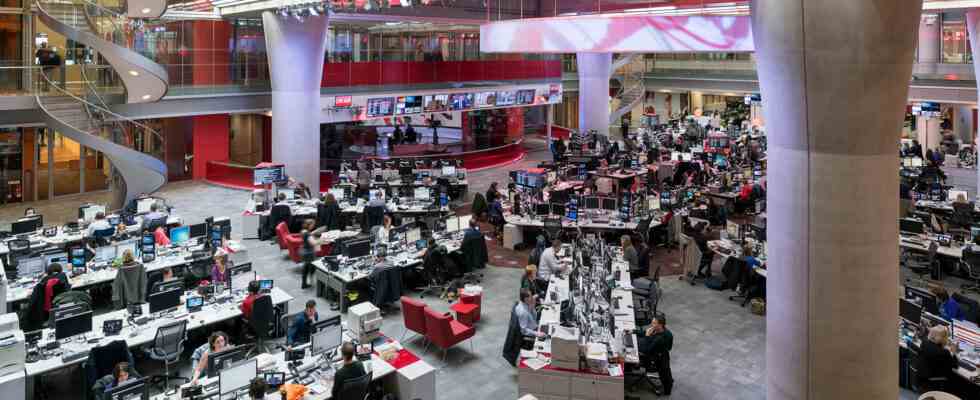Status: 10/18/2022 7:30 p.m
In the 100th year of its existence, the BBC is under pressure like never before: the British government wants to end fee funding. Attacks on the transmitter are not uncommon.
Turn on the radio to get an idea of the attacks the BBC is under. Jacob Rees-Mogg was interviewed there last week. The presenter asked the economy minister why the government is not presenting the plans for financing the tax cuts. After all, the pound fell after the press conference on the tax cut plans, after which the bond market experienced turbulence and the central bank had to carry out support purchases. Traders and financial market experts confirm this connection.
allegations and allegations
But Rees-Mogg denied this and accused the presenter of making connections that – allegedly – were not verifiable. This contradicts the principles that the BBC must be non-partisan. The question is a comment. Case in point.
Prime Minister Liz Truss said at a campaign event that the right-wing broadcaster GB News always had the facts at hand – unlike the BBC.
These allegations show very clearly what attacks the BBC is facing 100 years after it was founded. The government fights against critical journalism by discrediting the broadcaster. The government would like to abolish financing through fees. Alternative financing models are discussed.
“Unbalanced and Left”
In this environment, work is not easy for BBC journalists. Journalist Emily Maitlis has just left the BBC. In a widely acclaimed speech, she warned that journalism must change, address grievances, and not allow itself to be intimidated.
Maitlis said: “Twice we have heard from Liz Truss that an idea that has been heavily criticized has been ‘misinterpreted’ and that a question has been asked from a left-wing point of view.”
The BBC – as many Conservative MPs put it – is unbalanced, biased and left wing. And the newsrooms are responding – in part – by moving to the right to take the wind out of the criticism’s sails.
Example Brexit and the criticism
An example from 2016, when Great Britain was discussing the effects of Brexit: Maitlis described everyday editorial work: “It took our producers less than five minutes to find 60 economists who criticized Brexit. And it took five hours to get a single voice disagreeing with that. But when we went on the air, we had one from each point of view.”
And it may not have become sufficiently clear to the viewer that there were simply hardly any economists who could see the advantages of Brexit – which has remained the case to this day.
Media on the defensive
The scientist Ayala Panievski studied this phenomenon in Israel and wrote a scientific paper about it. Many of the media there are also accused by the government of being leftist and permeated by “communists”.
“Because they are constantly accused of being left-wing, they are moving to the right to refute the accusation,” says Panievski.
But that’s not how the public perceives it, says Panievski. In the end, the populists who could spread their views, the media would not get off the defensive, would win.
Danger: populists gain the upper hand
The image of the media as the enemy of the people, which former US President Donald Trump was fond of using, caught on.
Panievski explains: “Journalists also fear that if they don’t depict topics that populists set, the viewers will say: ‘Look, they are not objective.’ And then it gets reported. And then we have the situation that the populists determine the reporting.”
On the BBC’s 100th birthday, Panievski wishes more courage. Many media witnessed an important point in the story. Now it’s a matter of not letting one’s own work be undermined. Media is powerful. They would have to decide independently what information was important for the listener.
100 years BBC – broadcasters under pressure
Christoph Proessl, ARD London, 10/18/2022 6:48 p.m

